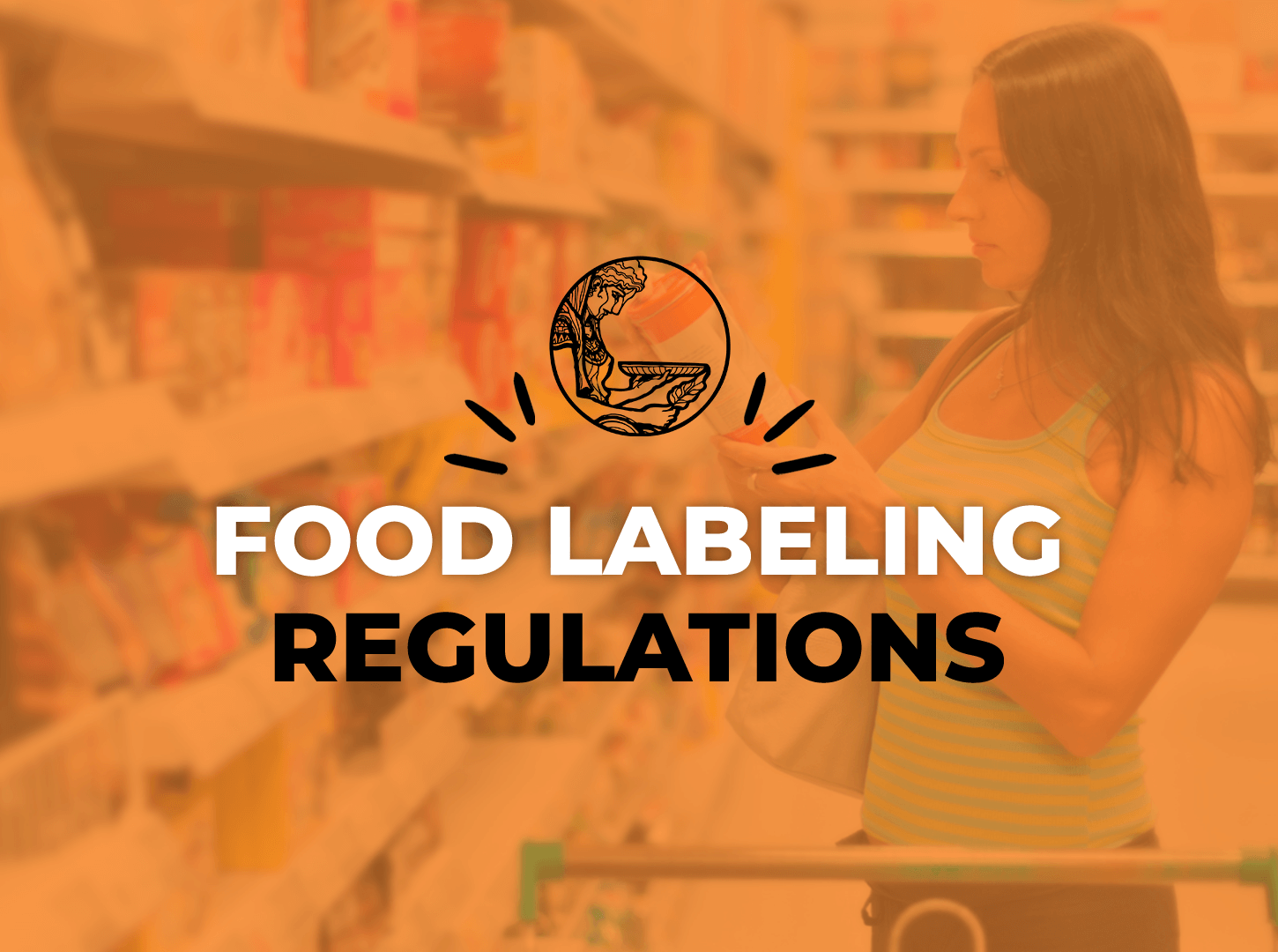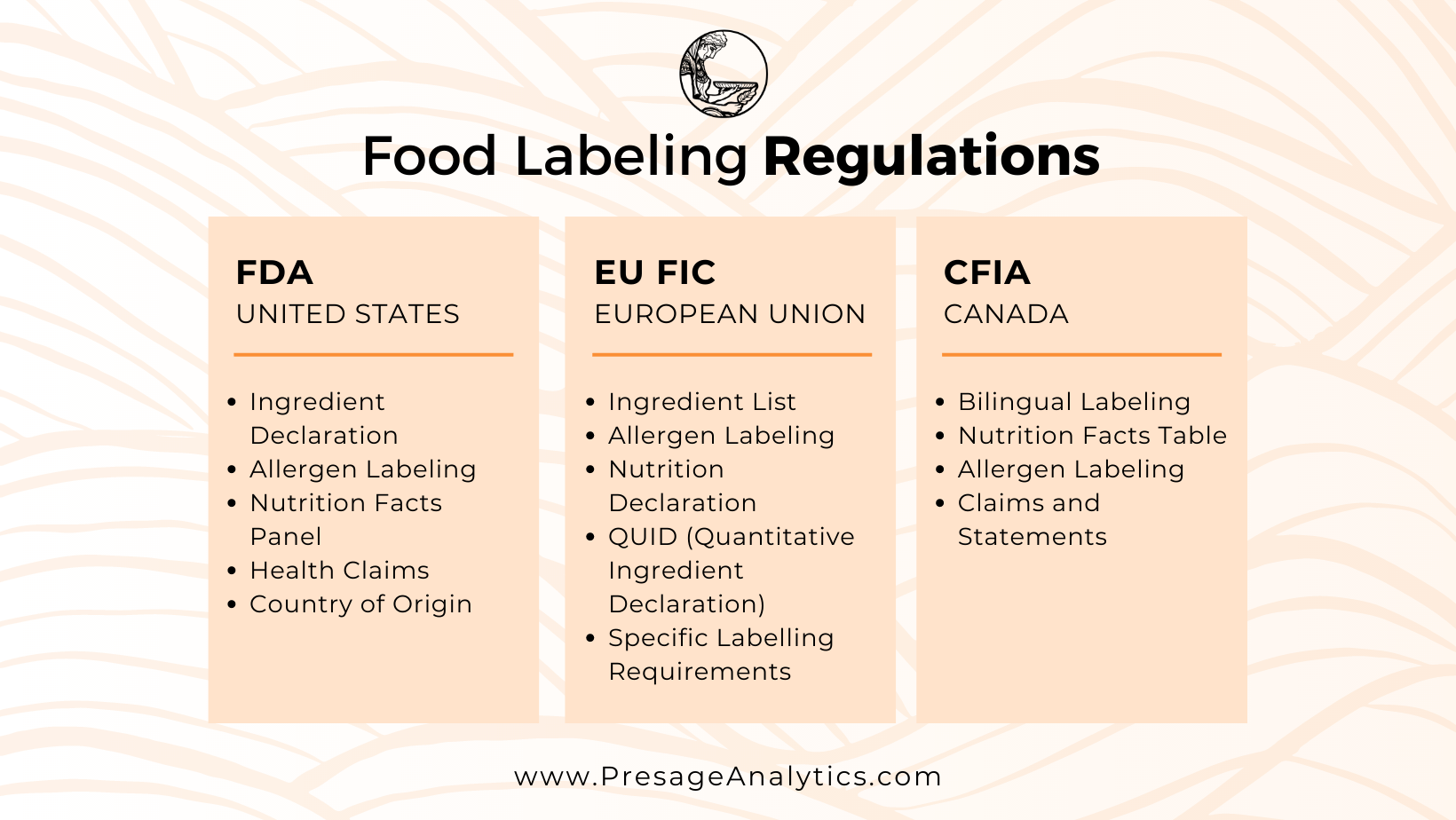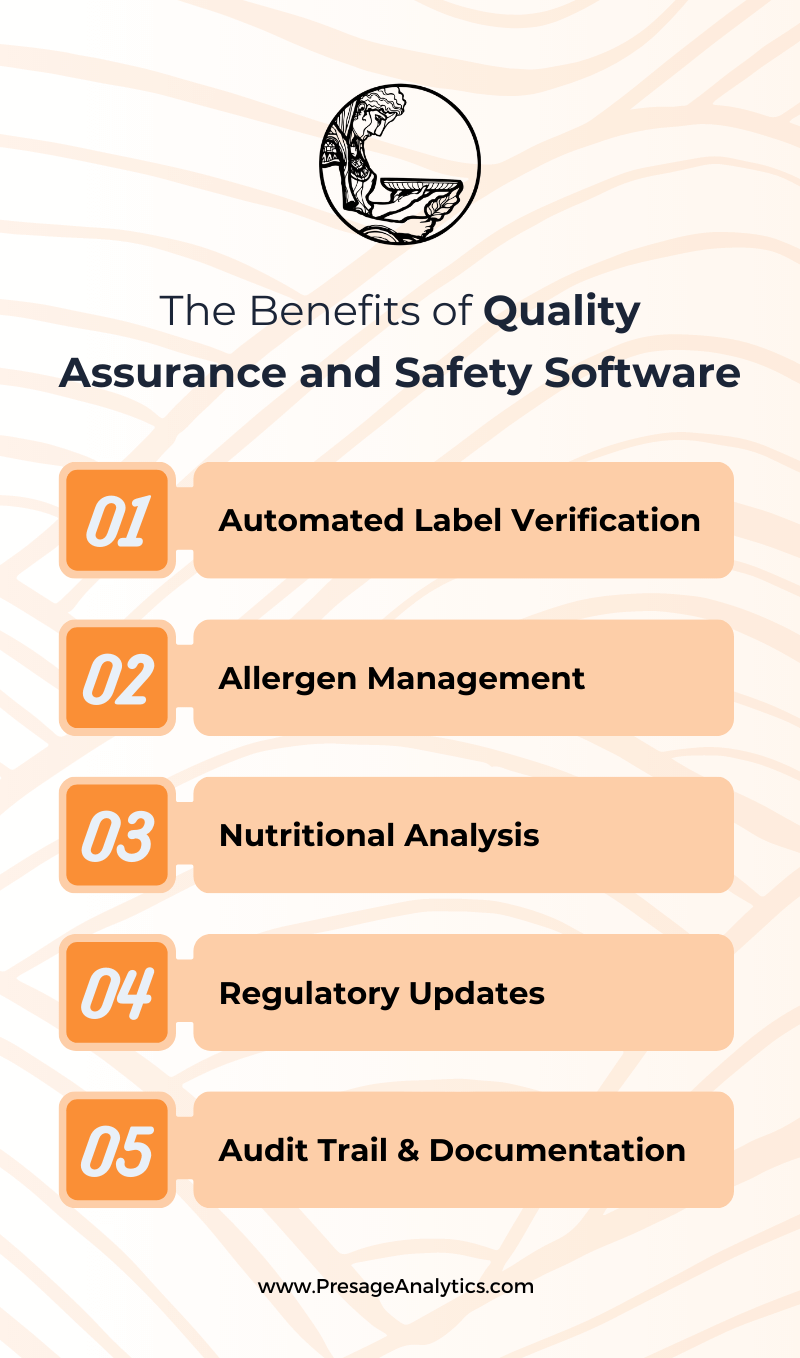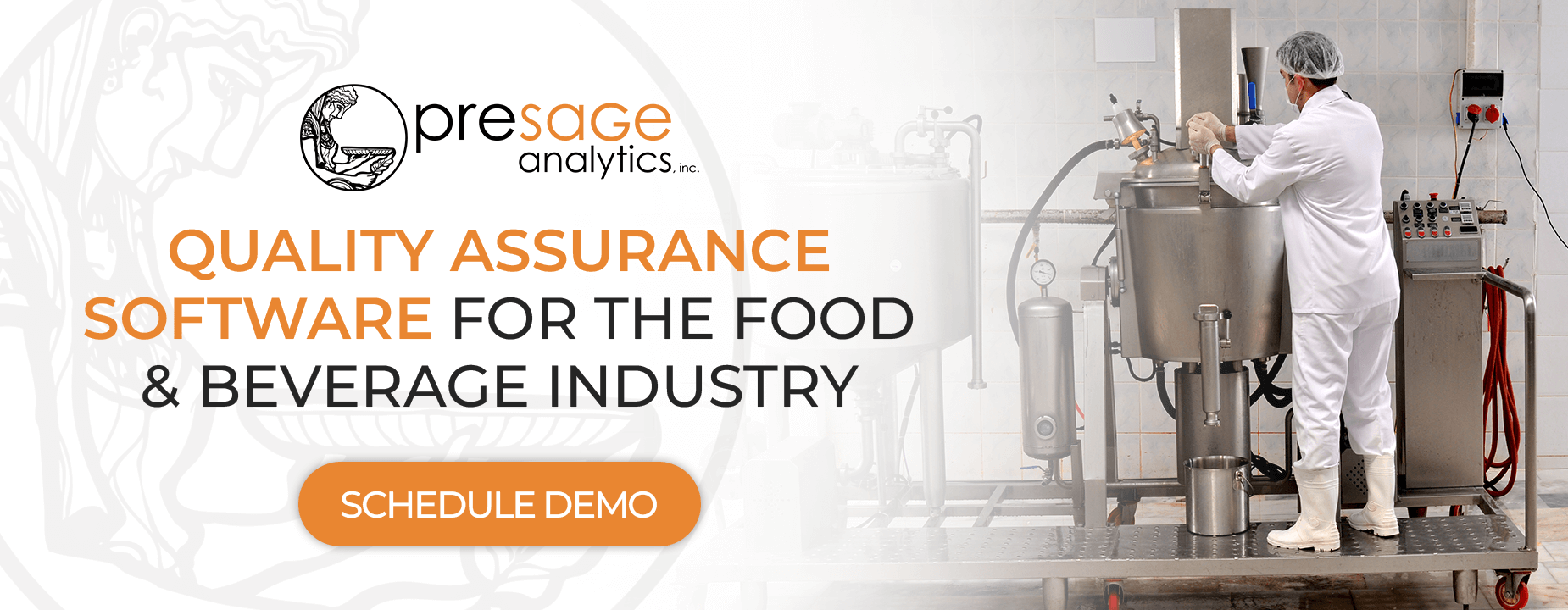Food Labeling Regulations: Ensuring Compliance and Consumer Transparency

In today’s increasingly conscious and health-conscious world, consumers are paying closer attention to the food and beverages they consume. They want to make informed choices about what they eat, considering factors such as ingredients, nutritional content, and potential allergens. To address these concerns, governments and regulatory bodies have implemented stringent food labeling regulations. Presage Analytics understands the importance of compliance with these regulations to ensure consumer transparency. In this blog post, we will take a look at the significance of food labeling regulations and how the right software can streamline processes for your plant.
The Importance of Food Labeling Regulations
Food labeling regulations are designed to protect consumers and provide them with accurate and relevant information about the products they purchase. These regulations vary depending on the country but generally cover aspects such as ingredient declaration, allergen labeling, nutrition facts, country of origin, and claims made on packaging. Compliance with these regulations is not only a legal requirement but also essential for building trust and maintaining consumer loyalty.
Ensuring Compliance with Food Labeling Regulations
Complying with food labeling regulations can be a complex and time-consuming task, especially for large-scale plants. Manual processes are prone to errors, and the risk of non-compliance can have severe consequences – including fines, product recalls, and damage to brand reputation. To mitigate these risks, companies need robust solutions tailored to their specific needs.

Different Food Labeling Regulations
Food labeling regulations can vary from country to country, and it is essential for food and beverage manufacturers to be familiar with the requirements of the markets they operate in. Here are some key food labeling regulations that are commonly enforced:
United States (FDA)
In the United States, the Food and Drug Administration (FDA) oversees food labeling regulations. Some key requirements include:
- Ingredient Declaration: All ingredients used in a product must be listed on the label, with the most prominent ingredients listed first.
- Allergen Labeling: Major food allergens, such as milk, eggs, peanuts, tree nuts, fish, shellfish, wheat, and soy, must be clearly stated on the label.
- Nutrition Facts Panel: Mandatory for most packaged foods, the nutrition facts panel provides information on calories, fat, cholesterol, sodium, carbohydrates, fiber, sugars, and protein.
- Health Claims: Specific requirements govern the use of health claims on food packaging, ensuring accuracy and preventing misleading statements.
- Country of Origin: Labels must indicate the country of origin for certain food products, such as fresh produce, fish, meat, and nuts.
European Union (EU FIC)
The European Union has established comprehensive food labeling regulations under the European Food Information to Consumers Regulation (EU FIC). Key requirements include:
- Ingredient List: All ingredients used in a product must be listed, with specific rules for allergens, additives, and flavorings.
- Allergen Labeling: Allergenic substances must be highlighted in the ingredients list, making them easily identifiable to consumers.
- Nutrition Declaration: Mandatory for most pre-packaged foods, nutrition information must be provided per 100g or 100ml, including energy value and amounts of fat, saturated fats, carbohydrates, sugars, protein, and salt.
- QUID (Quantitative Ingredient Declaration): If an ingredient or category of ingredients is prominently featured in the product name or has a visual representation, the percentage of that ingredient must be declared.
- Specific Labelling Requirements: Various specific labeling requirements exist for certain products, such as meat, fish, alcoholic beverages, and genetically modified organisms (GMOs).
Canada (CFIA)
In Canada, food labeling regulations are overseen by the Canadian Food Inspection Agency (CFIA). Key requirements include:
- Bilingual Labeling: Product labels must be in both English and French, Canada’s official languages.
- Ingredient Declaration: All ingredients must be listed, with specific requirements for allergens, food additives, and components of composite ingredients.
- Nutrition Facts Table: Mandatory for most pre-packaged foods, the nutrition facts table provides information on calories, fat, cholesterol, sodium, carbohydrates, fiber, sugars, and protein.
- Allergen Labeling: Allergenic ingredients must be identified in the ingredient list, using common names or specific terms defined by regulation.
- Claims and Statements: Specific requirements govern the use of claims and statements on food labels, ensuring accuracy and preventing misleading information.

Benefits of Quality Assurance and Safety Software
Implementing quality assurance and safety software streamlines the labeling compliance process and offers several key benefits:
- Automated Label Verification: Quality assurance software can automate label verification by comparing the information on product labels with the regulations and standards specific to each market. It flags any discrepancies or potential non-compliance issues, allowing manufacturers to rectify them before products reach the market.
- Allergen Management: Accurate allergen labeling is crucial to protect consumers with food allergies. Quality assurance software enables manufacturers to manage and track allergens throughout the production process, ensuring that the correct information is provided on labels and reducing the risk of cross-contamination.
- Nutritional Analysis: Nutritional information is a fundamental aspect of food labeling. Quality assurance software can perform nutritional analysis, calculating accurate values for calories, macronutrients, vitamins, and minerals based on the recipe and ingredients used. This helps manufacturers create compliant and informative labels.
- Streamlined Regulatory Updates: Food labeling regulations are subject to regular updates and changes. Quality assurance software keeps manufacturers informed about the latest regulations and automatically updates labeling templates and databases accordingly. This saves time and ensures ongoing compliance.
- Audit Trail and Documentation: Quality assurance software provides a comprehensive audit trail, recording all labeling-related activities and changes. This documentation is invaluable during internal audits, inspections, and regulatory compliance assessments.
Schedule a Demo with Presage Analytics
Presage Analytics offers a state-of-the-art software solution that caters specifically to the needs of the food and beverage industry. Our software is designed to help manufacturers ensure compliance with food labeling regulations, enhance consumer transparency, and minimize risks associated with non-compliance.
During a personalized demo, our sales team will walk you through the features and functionalities of our software, showcasing how it can streamline your labeling compliance processes. We understand the unique challenges faced by food and beverage manufacturers and will tailor our demo to address your specific requirements.
Conclusion
In conclusion, compliance with food labeling regulations is paramount for food and beverage manufacturers to meet consumer expectations and legal obligations. With the right quality assurance and safety software, manufacturers can streamline labeling compliance processes, reduce errors, and ensure consumer transparency. Presage Analytics’ comprehensive software solution offers the tools and functionalities needed to navigate the complex landscape of food labeling regulations successfully. Schedule a demo with our sales team today to discover how our software can empower your manufacturing plant to achieve compliance and build consumer trust.






